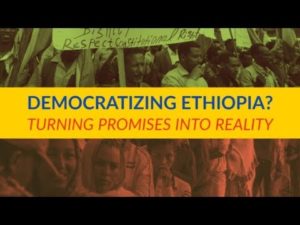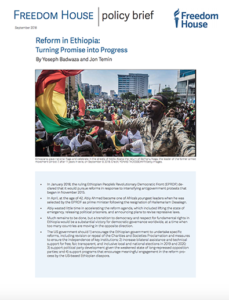It has been a whirlwind year for Ethiopia since Abiy Ahmed became prime minister, say analysts Ahmed Soliman and Abel Abate Demissie. He has initiated a raft of reforms to overhaul Ethiopia’s authoritarian government structure, significantly improved relations with neighbors and received widespread international acclaim, including a nomination for the Nobel Peace Prize.
But the same period has seen a sharp increase in lawlessness, intensified domestic conflict, heightened identity-based violence and huge internal displacement, they write for Chatham House, the UK-based foreign policy think tank:
 Abiy Ahmed has made great strides in his first year by challenging the status quo and disrupting the authoritarian state machinery. In his second year he must strive towards building a plural, democratic and stable political order, focusing on developing lasting institutions. For the prime minister’s reforms to stick he needs to revitalize the EPRDF under a new common vision and implement a sound economic strategy that consolidates hard-won recent gains. Most importantly, Abiy needs to address a deteriorating security situation that threatens the survival of the country.
Abiy Ahmed has made great strides in his first year by challenging the status quo and disrupting the authoritarian state machinery. In his second year he must strive towards building a plural, democratic and stable political order, focusing on developing lasting institutions. For the prime minister’s reforms to stick he needs to revitalize the EPRDF under a new common vision and implement a sound economic strategy that consolidates hard-won recent gains. Most importantly, Abiy needs to address a deteriorating security situation that threatens the survival of the country.
The democratization process that began after Abiy took office in Ethiopia one year ago will run aground unless its citizens become increasingly rooted in inclusive civil society institutions, like trade unions, that are capable of overcoming deeply entrenched ethnic, cultural and geographic divisions, said Confederation of Ethiopian Trade Unions (CETU) President Kassahun Follo, the Solidarity Center’s CAROLYN BUTLER reports:
 Indeed, Ethiopia’s workers are already connected across regional and ethnic lines due to CETU’s countrywide reach and its inclusive approach to membership and worker rights. Follo, speaking at a National Endowment for Democracy (NED) panel discussion titled, “Ethiopia’s Democratic Opening One Year Later: Looking Back and Looking Ahead,” said organizations promoting inclusivity are crucial in a country where citizens from 80 ethnic groups are represented by more than 100 ethnically and regionally based political parties. Taking advantage of an administrative structure that covers all nine regions of the country, CETU is uniquely positioned to take the democratization process beyond the capital, Addis Ababa, into lower levels of government across the country.
Indeed, Ethiopia’s workers are already connected across regional and ethnic lines due to CETU’s countrywide reach and its inclusive approach to membership and worker rights. Follo, speaking at a National Endowment for Democracy (NED) panel discussion titled, “Ethiopia’s Democratic Opening One Year Later: Looking Back and Looking Ahead,” said organizations promoting inclusivity are crucial in a country where citizens from 80 ethnic groups are represented by more than 100 ethnically and regionally based political parties. Taking advantage of an administrative structure that covers all nine regions of the country, CETU is uniquely positioned to take the democratization process beyond the capital, Addis Ababa, into lower levels of government across the country.
“Change at the top is not enough,” said Follo.
CETU is Ethiopia’s largest multi-ethnic civil society organization, representing about 570,000 workers organized into nine affiliated industrial federations and approximately 1,700 trade unions, Butler adds.







